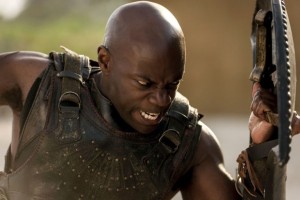I wonder what your thoughts are on the BBC’s new drama series, Troy: Fall of a City, which aired in the UK last Saturday. I admit I was only tentatively looking forward to watching it, as large and small screen adaptations of the Greek myths have too often left me disappointed and frustrated.
Mostly, I thought it faired well. The pace was a bit slow for some tastes, but I found it watchable. Others have complained that Bella Dayne isn’t beautiful enough to portray Helen, the “face that launched a thousand ships”. There are two sides to that argument. Firstly, how do you judge physical beauty, and how would the ancients have defined this? But on the other hand, as the series is aimed at a modern audience, shouldn’t beauty be measured by modern standards? Personally, I was happy with her in the role.
I also approve of the retelling of the story so far. In the main, the writers have followed the original myths. They didn’t shy away from featuring the gods, and I particularly liked the inclusion of Paris’s judgement between Hera, Athena and Aphrodite.
The look of Troy: Fall of a City was impressive. The CGI rendering of Troy was excellent, very much how I would have pictured the city. The producers also made a good effort at recreating the feel of the period, and didn’t make it look too much like Classical Greece. I enjoyed some of the details, such as the octopus-motif anchor stone beside Paris as he sails to Sparta (probably a little too elaborate for the Bronze Age, but I’m no expert on anchor stones).
Perhaps the biggest talking point has been the choice to include several black actors in Troy: Fall of a City. Historically speaking, there wouldn’t have been many sub-Saharan Africans in Bronze Age Greece or Troy, even as captured slaves. I’m not aware of archaeological evidence that shows there were, though I would be interested to hear of any. However, the choice of David Gyasi to play Achilles is telling. Achilles was the son of Peleus, king of the Myrmidones in Thessaly, northern Greece, so would have been ethnically Greek; and DNA tests of Bronze Age Greek remains suggest they would have looked very similar to Greeks of today. Therefore, the makers aren’t implying there was a considerable black population in Greece or Troy at the time. Indeed, on this point historical accuracy doesn’t seem to have been a concern. As producer Barry Reisz said: “Casting throughout was simply about picking the best actors. We’ve tried to be colour-blind”.
Many commentators dispute this, believing the choice to be a political one – read some of the comments on on-line articles to see what people are saying. If true, it’s a testament – along with the recent removal of Hylas and the Nymphs from the Manchester Art Gallery (https://www.glyn-iliffe.com/2018/02/hylas-and-the-nymphs/) – to the ongoing relevance of these ancient stories, and their power to stir up, or be used for, political debate. Would make a great topic for a Classics thesis!







Will save my judgment until the characters have become more rounded and embedded. Agree that Troy does have the look that historians believe it looked. But doesn’t Sparta look and feel too luxurious and soft?
Sparta would have been similar to other Greek cities at the time. Their famed militarism came about after the 7th century BC under Lycurgus. I agree about waiting another couple of episodes before passing final judgement.
Despite any controversy it has stirred up, it is the closest telling to the myths that have been televised so far. David Gyasi was initially a surprising choice for Achilles but as long as he plays his part well it would not be fair to deny him that.
It certainly has great visuals and, pace, I think, is picking up.